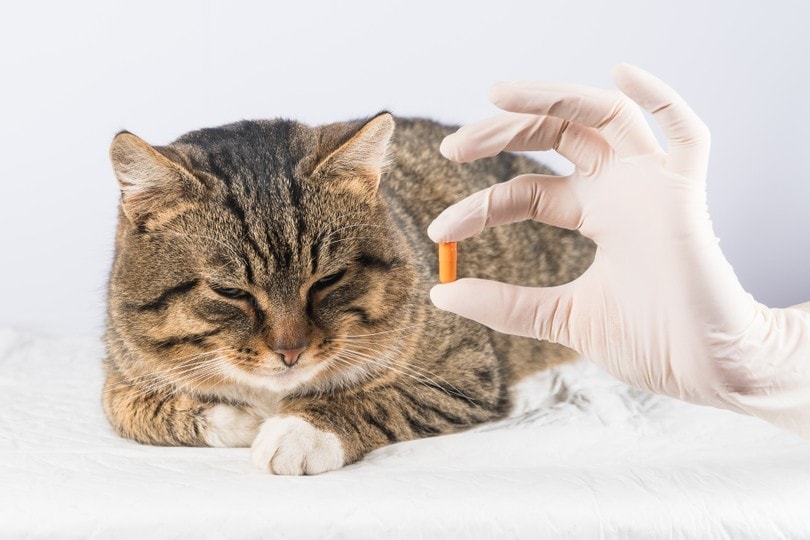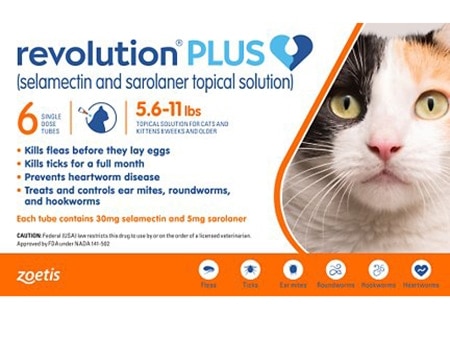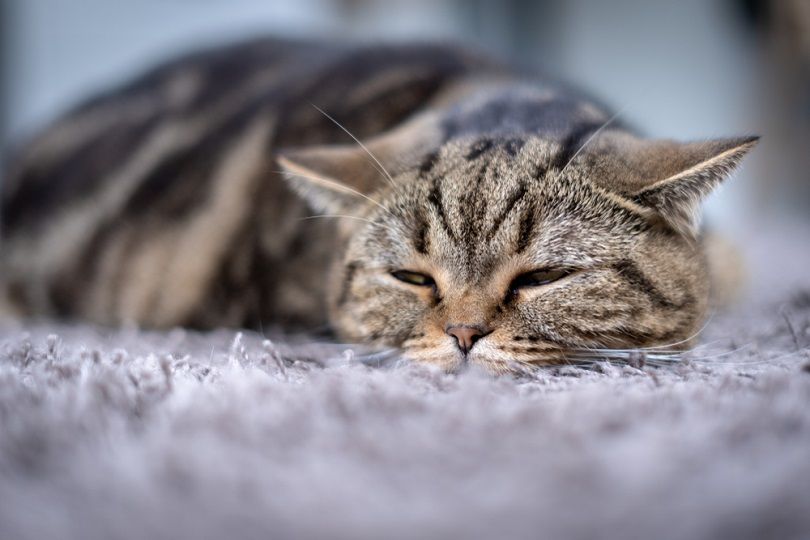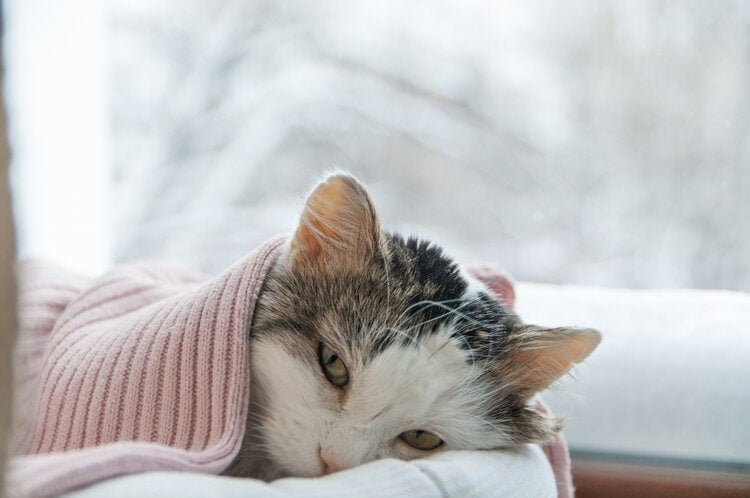10 Best Cat Dewormers – 2024 Reviews & Top Picks

Updated on

Parasites are a major problem for cats, especially kittens. They can harm your cat’s digestive system and left untreated can go on to cause skin irritation and even anemia. Dewormers work best when you know what type of parasite you are dealing with, although broad-spectrum options do exist that aim to eradicate all known parasitic worms. You should also check that the product is suitable for your cat according to age and delivery method.
The choice can be overwhelming especially considering the prescription-only, over-the-counter, and natural products that are on the market. Read on to see our reviews of the 10 best cat dewormers we found.
Note: Hepper does not advocate the practice of deworming at home without explicit medical instructions from your vet. Many of these products require a prescription.
A Quick Comparison of Our Favorites in 2024
| Rating | Image | Product | Details | |
|---|---|---|---|---|
| Best Overall |
 |
Bayer Drontal Cat Dewormer |
|
Check Price |
| Best Value |
 |
Hartz UltraGuard Cat Rid Worm |
|
Check Price |
| Premium Choice |
 |
Bayer Advantage Topical Cat Solution |
|
Check Price |
| Best for Kittens |
 |
Revolution Topical Solution for Kittens |
|
Check Price |
| other |
 |
Homeopet WRM Clear Dewormer |
|
Check Price |
The 10 Best Cat Dewormers
1. Bayer Drontal Cat Dewormer – Best Overall

| Prescription required: | Yes |
| Minimum age: | 4 weeks |
| Delivery method: | Tablet |
| Treats: | Tapeworm, Roundworm, Hookworm |
Bayer’s Drontal is a broad-spectrum dewormer, which means that it treats a range of different parasites. Specifically, it will kill tapeworm, roundworm, and hookworm. It is a tablet dewormer, with each tablet scored so that it can be easily cut in half for more accurate dosing for kittens and small cats. If your cat refuses the tablet, it can be crushed and placed in food to make it more palatable and to ensure a greater chance of deworming success.
Although this medication has proven effective in a lot of cats, it does not prevent reinfestation which means that you will have to treat the worms again when they crop up. The tablet can be bought individually, which prevents spending money on unnecessary drugs, and its ability to tackle multiple types of parasites make this our choice as the best overall cat dewormer.
- Reasonable price
- Tablet is easily split
- Broad-spectrum dewormer works on multiple parasites
- Needs a prescription
- Doesn’t prevent reinfestation
2. Hartz UltraGuard Rid Worm Cat Dewormer – Best Value

| Prescription required: | No |
| Minimum age: | 8 weeks |
| Delivery method: | Liquid |
| Treats: | Roundworms |
Hartz UltraGuard Rid Worm Dewormer is a liquid dewormer that can be given directly to your cat, if it is agreeable, or that you can mix into food or a favorite treat to make it easier to administer. It does not require a prescription and the size of the bottle means that you will have more than enough to last several months, even with fortnightly application which might be required for stubborn infestations.
It is recommended that you only deworm a cat twice a year, unless recommended to do it more often, and Hartz says that you should give a second dose 14 days after the first to ensure that it gets rid of roundworm. Liquid dewormer is easy to administer and this bottle is cheap, making it the best cat dewormer for the money. It has also proven effective in the fight against roundworm, but it should not be used to treat other parasites and it does require a second dose.
- Liquid is easy to administer
- Cheap
- Good sized bottle
- Needs reapplication after 14 days
- Only treats roundworm
3. Bayer Advantage Topical Solution For Cats – Premium Choice

| Prescription required: | Yes |
| Minimum age: | 2 pounds |
| Delivery method: | Topical |
| Treats: | Broad spectrum |
Bayer Advantage Multi Topical Solution is a topical spot-on wormer that treats fleas, ear mites, and roundworm and hookworms. Bayer also states that it might help treat heartworms in some cats. It is suitable for felines that weigh more than 2 pounds but it is only available with a prescription and it is pricey compared to other deworming solutions. It is effective for ear mites but because it is used to treat fleas and mites, it needs to be reapplied every month, which bumps the price up even further compared to buying and applying a dedicated wormer twice a year. Spot-on applicators are applied between the shoulder blades. Split the hair first to ensure that the wormer is applied directly to the skin and do not allow your cat to lick or groom the area for at least 30 minutes after.
- Treats fleas, mites, and worms
- Topical application may be easier than tablets
- Prescription required
- Needs monthly application
- Expensive
4. Revolution Topical Solution for Kittens – Best for Kittens

| Prescription required: | Yes |
| Minimum age: | 8 weeks |
| Delivery method: | Topical |
| Treats: | Heartworms, Fleas, Ear Mites, Roundworms, Hookworms |
Revolution Topical Solution for Kittens and Puppies is expensive but it is broad-spectrum, killing fleas and potentially also controlling ear mites. In terms of parasitic worms, it kills heartworms, roundworms, and hookworms.
This is another broad-spectrum treatment that aims to eradicate fleas, which takes monthly treatment, and it is already an expensive item, so expect to pay more for Revolution. However, it has been tested to be safe for kittens and it can be used on your kitten from as young as eight weeks old, making it the best dewormer for kittens. This is a spot-on treatment, which should be easy to apply to kittens.
- Treats fleas, ear mites, and worms
- Topical application
- Suitable for kittens over 8 weeks
- Needs reapplying every month
- Expensive
5. Homeopet WRM Clear Cat Dewormer – Best OTC Dewormer

| Prescription required: | No |
| Minimum age: | Adult |
| Delivery method: | Liquid |
| Treats: | Roundworms, Hookworms, Tapeworms, Whipworms |
HomeoPet WRM Clear Dewormer is a homeopathic liquid that acts as a broad-spectrum deworming solution. It treats roundworms, hookworms, tapeworms, and whipworms, and it helps prevent reinfestation because it eradicates eggs as soon as they appear. The bottle does carry 450 drops of tasteless and colorless liquid which can be given directly to your animal or it can be mixed in with water or other liquid.
It has no reported side effects but it does require multiple doses and needs reapplying quite regularly so you will need a steady supply. It is also only considered suitable for adult cats, and not to be used on kittens. Available without a prescription, Homeopet is the best over-the-counter dewormer because it is a broad spectrum and uses natural ingredients.
- Odorless, colorless liquid
- Homeopathic liquid
- Broad spectrum
- Requires multiple doses
- Needs redosing regularly
6. Bayer Dewormer for Tapeworms for Cats

| Prescription required: | No |
| Minimum age: | Adult |
| Delivery method: | Tablet |
| Treats: | Tapeworms |
Tapeworms are the most common infestation in cats. These small white worms can be seen in your cat’s feces but they may also be spotted escaping from your cat’s anus while it is asleep or in their bedding. They are about the size of a grain of rice. Although rare, tapeworms can cause death in cats and kittens, especially if they are left untreated for a long time.
Bayer is a well-respected brand in the deworming and pet care market, and their Dewormer for Tapeworms for Cats is our pick as the best tapeworm medicine for cats. It is reasonably priced, available without a prescription, and it can be used on kittens over the age of six weeks, as well as adult cats. It is a tablet, although it can be crushed into food for difficult patients.
- Decent price
- Effective against tapeworms
- Can be used at six weeks
- Tablet form
- Only effective against tapeworms
7. Interceptor Chewable Tablet for Dogs

| Prescription required: | Yes |
| Minimum age: | 6 weeks |
| Delivery method: | Chewable |
| Treats: | Heartworm, Roundworm, Hookworm, Whipworm |
Interceptor Chewable Tablet for Dogs is also suitable for cats and can even be used on kittens as young as six weeks. It is a broad-spectrum chewable tablet, treating heartworm, roundworm, hookworm, and whipworm.
Because it is chewable, it should be easy for your cat to digest, although the problem with chewable tablets is that if your cat won’t readily take it, you will struggle to administer it. Tablets can be crushed but chewable tabs cannot. The product is reasonably priced, however, and enjoys positive results in most cats which ensures that it offers good value for money.
- Suitable from 6 weeks
- Broad-spectrum parasite medication
- Reasonable price
- Chewable tablets may not be popular with cats
- Doesn’t treat tapeworm
8. Revolution Plus Topical Solution For Cats

| Prescription required: | Yes |
| Minimum age: | 8 weeks |
| Delivery method: | Topical |
| Treats: | Fleas, Ticks, Heartworm, Roundworms, Hookworms, Ear Mites |
Revolution Plus Topical Solution For Cats really is a broad-spectrum solution, treating everything from fleas to ear mites and heartworms. If you need something to treat multiple infestations, then this solution can work out cheap and convenient. You apply a single prescription topical and it will treat all the problems that your cat is suffering. However, if you only need treatment for a single problem, it may work out more expensive.
The topical solution is a spot-on application for the back of the neck, can be used on kittens from the age of eight weeks, but it is expensive and does not treat tapeworm, which will require additional treatment.
- Broad-spectrum application
- Topical delivery method
- Expensive
- You may not need to treat everything
- Doesn’t treat tapeworm
9. Naturpet D Wormer Homeopathic Medicine

| Prescription required: | No |
| Minimum age: | Adult |
| Delivery method: | Liquid |
| Treats: | Pinworms, Whipworms, Tapeworms, Roundworms |
Naturpet D Wormer Homeopathic Medicine is a homeopathic and natural alternative to drugs and prescription medication. It is made from a combination of wormwood, walnut, cumin seed, sage, fennel, and papaya. As well as treating pinworms, whipworms, roundworms, and also tapeworms, it can even help prevent and ease gas in your pet.
It is only listed as safe for use by adult cats, however, so you should not risk its use with kittens. Because of the unusual flavors in the liquid, some cats will not readily take the liquid. It also smells strong, which makes it difficult to even hide the liquid in your cat’s favorite treats. Also, you need to administer it, in food, twice a day for two weeks, rather than a single dose.
- Homeopathic solution
- Broad-spectrum dewormer
- Treats tapeworms
- Cheap
- Unusual tastes for cats
- A strong smell makes it difficult to hide
- Requires regular dosing
10. Bravecto Plus Topical Solution for Cats

| Prescription required: | Yes |
| Minimum age: | 6 months |
| Delivery method: | Topical |
| Treats: | Fleas, Ticks, Heartworm, Hookworms |
Bravecto Plus Topical Solution for Cats is suitable for kittens aged 6 months or older, which is during the later stages of kittenhood. It is an expensive treatment, although it does protect for up to two months at a time.
It is a spot-on applicator that most owners get along with, although some particularly reticent cats can make application from a tube quite challenging. All cats, at some time, will suffer from fleas, ticks, and parasitic infestation. Even indoor cats can pick them up from your clothes and shoes or their canine companion.
- Treats fleas, ticks, heartworms, and hookworms
- Topical application
- Treatment lasts two months
- Expensive
- Doesn’t treat tapeworm
- Only suitable for 6 months and up
Buyer’s Guide: How to Choose the Best Cat Dewormer
Worms in your cat can be unpleasant for you, as well as for your feline friend. They tend to come out in feces but may also be found on your cat or in their bed. They are especially common in the fur around the anus because they might slither out when your cat is relaxed. Worms, when left untreated, can also cause serious distress and physical harm to your cat. Unfortunately, cats can and do pick up parasitic infestations regularly throughout their lives. While it is more common in outdoor cats, even indoor cats can pick them up and will need treating. We have provided reviews of what we believe are the 10 best cat dewormers above: read on to see how we chose and what you should look for when looking for a dewormer for your cats.

Types of Worms
There is a range of parasites, or worms, that can infect your cat. Common symptoms include diarrhea and gastrointestinal upset, skin complaints, and listlessness. Your cat may also go off its food. Below are some of the most common types of worms that need treating and that deworming solutions do treat. If you already know the type of worms your cat has, it makes treatment a lot more effective because you can choose a product that has been designed specifically to tackle that infestation.
- Roundworms – Ascarids are the most common of all parasitic worms in cats. They live in soil and once they reach maturity in your cat, they can be evident in their feces. If you know that your cat is infected, treat them soon, and ensure that you take extra care when handling the litter tray because the worms can pass from the feces to humans, too.
- Tapeworms – Tapeworms are not usually a problem in kittens but are very common in adult cats. They are contracted from the stomach of fleas when your cat eats a flea, so these are usually accompanied by a flea infestation, which is why many products designed to treat tapeworms will also treat fleas and kill flea larvae: it prevents reinfestation of roundworms because it cuts off the source. Tapeworms look like small grains of rice, and if you accidentally swallow a flea, you could contract tapeworms yourself.
- Hookworms – Cats can contract hookworms and the most common means of infestation is from a dog that is carrying this infestation. They live in the small intestine and they consume blood, putting an infected cat at risk of anemia.
- Lungworms – As the name suggests, these attack the lungs of your cat. They are carried on snails and slugs so your cat is more likely to get them during wet months and in wet locations. If the snail is eaten by another animal and your cat eats that animal, the worms can be passed along from one species to the next. Because lungworms take residence in the lungs, they can cause your cat to cough.
- Heartworm – Heartworms have become increasingly common in cats despite only being present in dogs until recently. They are passed on through the bites of mosquitos. There are no proven treatments for heartworm and your cat should get rid of them naturally over time.
Other Infestations
Many of the products in our list can treat more than one type of worms, and you will also find those that claim to treat other bugs and infestations. Specifically, it is quite common to see single treatments that take on fleas, mites, and worms. If you are paying extra for a product that treats all of these problems but your cat does not need ear mite treatment, you could be paying more than necessary. On the other hand, some owners like to take a preventative approach to such issues, and giving an ear mite treatment means that your cat should remain mite-free.

Symptoms of Worms
Symptoms can vary from cat to cat and certainly from worm type to worm type. The most common symptoms, however, include weight loss despite looking bloated. If your cat is unexpectedly losing weight, then you should take them to the vet anyway, because it could be a symptom of a serious illness or problem.
If your cat has a bulging tummy and its fur condition has worsened, this combination is a good sign that your cat does indeed have parasites.
Diarrhea is another common symptom of fleas, but any change in your cat’s bowel habits should be investigated if it is unexpected.
Many species of worms can be seen. This is especially true in your cat’s feces, where you might see the whole worm or parts of it.
If you see your cat dragging its bottom on the floor, this is a good indication that it has worms. It is usually a sign that the worms are causing irritation or may be causing some pain around the anus.
Worms in Kittens
Worms tend to come from other cats, dogs, mosquitos, slugs, and soil. As a kitten does not go out and rarely meets any cats other than its littermates and parents, it can be surprising when you discover your kitten has parasitic worms. However, a kitten can pick up worms from its mum and even from your clothes and shoes.
Application Method
Most dewormers come in the following forms or methods of application. There are pros and cons to each, and the choice of which is best is usually determined by what your cat considers acceptable.
- Tablet – The tablet is the traditional mode of application. If it can be fed whole, it is convenient and easy to give. Many cats refuse tablets, however, but they can also be crushed up and added to food or a food treat to make them disappear more easily. Some tablets can be broken in half for small cats and kittens.
- Chewable – A chewable is a form of a capsule that is designed to be chewed before swallowing. Not all cats will readily accept chewable tablets, so you may need to ensure that they are an appealing flavor or scent first.
- Liquid – A liquid is a versatile means of medication. It can be mixed with food or a food-based treat. If it is tasteless and odorless it could be given directly or mixed in with water. However, some remedies have a strong smell or flavor, and this can render the liquid almost impossible to give.
- Topical – Topical just means that a medication is applied to the skin. In the case of dewormers and flea treatments, this usually means that it is a spot-on application. This is applied on the neck, between the shoulder blades, and then works its way naturally down the body. Applying this type of treatment may require two sets of hands, and one set might need to be gloved.
Application Frequency
Whichever treatment you buy, a single dose will not last a lifetime. Depending on the treatment, the severity of the infestation, and whether your cat lives a life that means it is at risk of reinfestation, you may need to give multiple doses to ensure that the medication works effectively, and you may need to reapply it every month, two months, or six months. Always check before buying because this can make a big difference to the annual cost of worming your cats.
Final Thoughts
Worms are common in adult cats and in kittens. They can cause gastrointestinal upset, diarrhea, and a host of other physical symptoms. They can also cause discomfort and make your cat listless. Treatment can come in the form of liquids, tablets, chewable capsules, and topical treatments, and for cats of all ages. Different treatments are often required for different parasites, and if you know which type of worm has infected your cat, it can make treatment more effective.
While compiling our reviews, we found Bayer’s Drontal to be the best all-around dewormer, while Hartz UltraGuard offered the best value for money. We hope this guide has helped you choose the right wormer for your cat or kitten.
Featured Image Credit: Irina 1 Nikolaenko, Shutterstock












